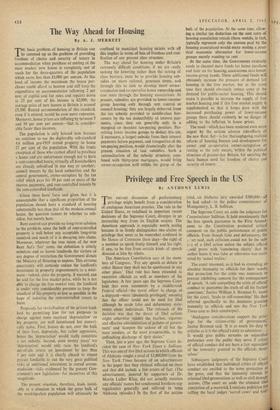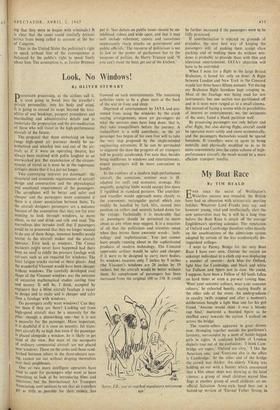Privilege and Free Speech in the US
By ANTHONY LEWIS
THE current discussion of parliamentary privilege might benefit from a consideration of analogous American practice. The rule in the United States, as redefined in important recent decisions of the Supreme Court, diverges in an interesting way from its English origins. The American approach is especially worth noting because it so firmly distinguishes two claims of privilege that seem to be somewhat confused in the House of Commons these days—the right of a member to speak freely himself and his right, if any, to be free from certain kinds of speech directed at him by others.
The American Constitution says of the mem- bers of Congress: 'For any speech or debate in either House they shall not be questioned in any other place.' That rule has been extended to executive officials as well as members of the legislature. A few years ago the Supreme Court held that even statements by a middle-rank Federal official—the naval officer in charge of a shipyard—were 'absolutely privileged,' meaning that the officer could not be sued for libel although he made false and defamatory state- ments about individuals. The rationale of the decision was that the threat of libel actions might otherwise 'inhibit the fearless, vigorous and effective administration of policies of govern- ment' and 'dampen the ardour of all but the most resolute, or the most irresponsible, in the unflinching discharge of their duties.'
Then, just a year ago, the Supreme Court de- cided the case of New York Thnes v. Sullivan. This was one of five libel actions inwhich officials of Alabama sought a total of $3,000,000 from the New York Times because of an advertisement in the paper that they claimed reflected on them and that did include a few errors of fact. (The advertisement, inserted by supporters of Dr. Martin Luther King, did not actually mention any officials' names but condemned Southern seg- regationists generally and referred to some Alabama episodes.) In the first of the actions
tried, an Alabama jury awarded $500,000—all he had asked—to the police commissioner of Montgomery, L. B. Sullivan.
The Supreme Court set aside the judgment for Commissioner Sullivan. It held unanimously that the free speech guarantee in the First Amend- ment to the Constitution protected critical comment on the public performance of public officials. Even though false and defamatory, the irt said, such criticism could not be the sub- j.::t of a libel action Unless the subject official Lould prove with 'convincing clarity' that its author knew it was false or otherwise was moti- vated by 'actual malice.'
The court reasoned, as it had in extending all absolute immunity to officials for their words, that protection for the critic was necessary to prevent inhibiting concern for the consequences of speech. 'A rule compelling the critic of official conduct to guarantee the truth of all his factual assertions,' Justice William J. Brennan Jr. wrote for the court, 'leads to self-censorship.' He theft referred specifically to the decisions granting immunity to officials and saw the New York Times case as their counterpart.
'Analogous considerations support the privi- lege for the citizen-critic of government,' Justice Brennan said. 'It is as much his duty to criticise as it is the official's duty to administer. ... It would give public servants an unjustified preference over the public they serve if critics of official conduct did not have a fair equivalent of the immunity granted to the officials them- selves.'
Subsequent judgments of the Supreme Court have established that individual critics of official conduct arc entitled to the same protection aS the press, and that the immunity extends to criminal libel prosecutions as well as civil damage actions. (The court set aside the criminal libel conviction of a maverick Louisiana politician for calling the local judges 'sacred cows' and hint'







































 Previous page
Previous page